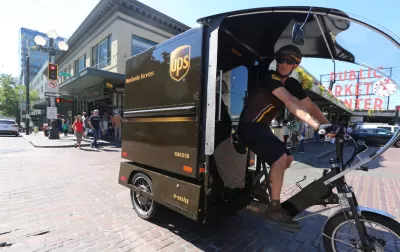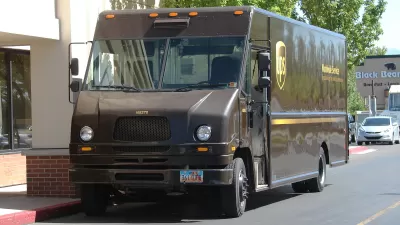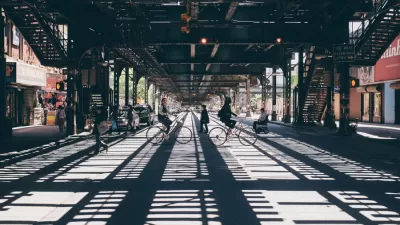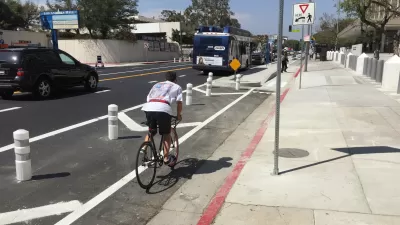The program deployed electric cargo bikes in a small Seattle neighborhood to test the effectiveness of replacing delivery trucks with lighter vehicles in the last mile of delivery.

A pilot program that used electric cargo bikes to make deliveries in a Seattle neighborhood reduced emissions for each package by 30 percent, reports Kristin Toussaint. The bikes were meant to replace delivery trucks that "cause congestion and spew carbon emissions as they drop off more and more packages" in the last mile of delivery. "The Seattle pilot—a partnership between the city, Coaster Cycles, logistics company AxleHire, and others, coordinated by the University of Washington’s Urban Freight Lab—tested last-mile alternatives like e-cargo bikes and delivery lockers, in hopes of finding solutions that reduced emissions and eased traffic."
Although it might seem like zero-emission delivery vehicles should reduce emissions by more than 30 percent, "researchers counted emissions from the truck bringing goods to the micro-hub, explains Anne Goodchild, founding director of the UW Supply Chain Transportation and Logistics Center, which launched the Urban Freight Lab."
"Along with reducing emissions, using e-bikes and the microhub halved the number of miles traveled per package compared to traditional truck routes, which helped to reduce congestion." While the pilot program had its limitations and may not show the same results at scale, improved bike lanes and parking infrastructure could help. "Testing these ideas before they can be called solutions is a crucial step in designing better last-mile delivery, and Goodchild hopes her lab’s research helps inspire additional delivery pilots."
FULL STORY: This e-bike delivery experiment reduced CO2 emissions by 30% per package

Alabama: Trump Terminates Settlements for Black Communities Harmed By Raw Sewage
Trump deemed the landmark civil rights agreement “illegal DEI and environmental justice policy.”

Study: Maui’s Plan to Convert Vacation Rentals to Long-Term Housing Could Cause Nearly $1 Billion Economic Loss
The plan would reduce visitor accommodation by 25% resulting in 1,900 jobs lost.

Planetizen Federal Action Tracker
A weekly monitor of how Trump’s orders and actions are impacting planners and planning in America.

Waymo Gets Permission to Map SF’s Market Street
If allowed to operate on the traffic-restricted street, Waymo’s autonomous taxis would have a leg up over ride-hailing competitors — and counter the city’s efforts to grow bike and pedestrian on the thoroughfare.

Parklet Symposium Highlights the Success of Shared Spaces
Parklets got a boost during the Covid-19 pandemic, when the concept was translated to outdoor dining programs that offered restaurants a lifeline during the shutdown.

Federal Homelessness Agency Places Entire Staff on Leave
The U.S. Interagency Council on Homelessness is the only federal agency dedicated to preventing and ending homelessness.
Urban Design for Planners 1: Software Tools
This six-course series explores essential urban design concepts using open source software and equips planners with the tools they need to participate fully in the urban design process.
Planning for Universal Design
Learn the tools for implementing Universal Design in planning regulations.
Caltrans
Smith Gee Studio
Institute for Housing and Urban Development Studies (IHS)
City of Grandview
Harvard GSD Executive Education
Toledo-Lucas County Plan Commissions
Salt Lake City
NYU Wagner Graduate School of Public Service





























